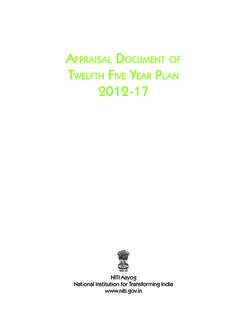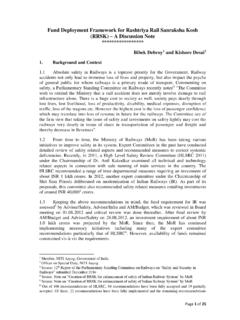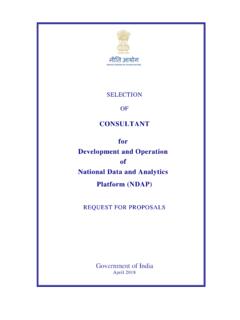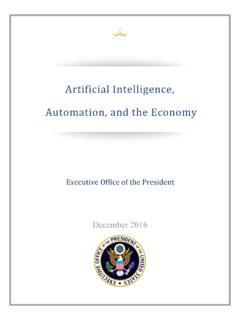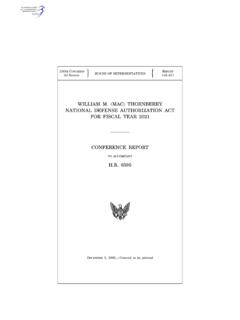Transcription of RESPONSIBLE AI #AIForAll - niti.gov.in
1 Approach Document for India:Part 2 - Operationalizing Principles for RESPONSIBLE AIAUGUST 2021 RESPONSIBLE AI#AIForAllAUGUST 2021 RESPONSIBLE AI#AIFORALLA pproach Document For India: Part 2 - Operationalizing Principles For RESPONSIBLE AIiiiAcknowledgementsIn writing this report, Rohit Satish and Preeti Syal from NITI Aayog have made valuable are pleased to have collaborated with the World Economic Forum Centre for the Fourth Industrial Revolution as the Knowledge partner in developing the RESPONSIBLE AI for All approach document. The valuable contributions of Ms. Arunima Sarkar from World Economic Forum are acknowledged. Legal inputs by Shardul Amarchand Mangaldass are also are also grateful for the support and contributions of several experts from India and globally including Prof Amit Sethi, Prof Balaraman Ravindran, Google India, Mr John Havens and Srichandra (IEEE), Prof Mayank Vatsa, Dr P Anandan and Dr Rahul Panicker from Wadhwani Institute for artificial intelligence , Dr.
2 Rohini Srivathsa (Microsoft), Tanay Mahindru (NITI Aayog) and Vidhi Center for Legal Policy. Valuable inputs were also provided by various Ministries/ Departments of the Government of India and regulatory institutions, namely MeitY, DST, DBT, Office of the PSA, MoHUA, RBI and RoySr. Advisor,NITI AayogAcknowledgementsvForewordArtificial intelligence has seen significant growth in India in the past few years. India with its robust startup ecosystem with AI powered innovation has the highest AI skill penetration rate in the world. The job market for AI has also shown promising growth with AI Specialist being among the top job roles in India in 2020. Various Government entities have also leveraged AI powered innovations in offering efficient services and enabling transparent is just the beginning and the momentum needs to be sustained.
3 The National strategy for artificial intelligence underlines the importance of a trusted ecosystem for accelerated adoption of the technology. This is particularly relevant for India as AI for All is the core of the national strategy and the well documented diversity, digital divide, scale and lack of awareness provides a fertile ground for the risks of AI to amplify. The importance of ensuring RESPONSIBLE use of technology was echoed by the Hon ble Prime Minister himself at the Davos Summit of World Economic Forum in January, 2021. In this regard, an approach document on Principles of RESPONSIBLE AI , based on wide ranging consultations, was released in February 2021. The document identified seven principles derived from the tenets of the Indian Constitution which provide a guiding framework for various stakeholders in leveraging AI.
4 While identifying the principles is an essential starting point, operationalizing them is the next important step. Ensuring that AI systems adhere to the principles requires a multi-disciplinary approach and a behavioral shift in organizational processes and practices. The multi-faceted role of the Government as a policy maker, regulator, and procurer makes it an important stakeholder in the operationalization of the principles. However, it is also important to note that Government interventions alone are not sufficient and it is important for the entire ecosystem to play its role in ensuring to put in place a trusted AI document identifies the various mechanisms needed for operationalizing these seven principles.
5 It is a culmination of a series of interviews with experts and AI practitioners over the past year. This follows a working document that was placed for public consultation last year. It outlines the specific role for the Government and recommends a multi-disciplinary advisory body to guide the various activities. It is extremely important that any measures taken to regulate the technology must be proportional to the risk and must be balanced to encourage innovation. The document also recommends measures for the private sector, research and academia to build an institutional capacity to evaluate the risks and undertake actions to appropriately address them. ForewordTowards RESPONSIBLE AI for AllviWe hope the country and the AI community at large will join and support us in this effort to create a RESPONSIBLE AI ecosystem and unleash the enormous potential of AI in the Rajiv KumarviiContents 1.
6 Principles for RESPONSIBLE AI- A Background 01 2. RESPONSIBLE AI and India 05 3. Role of Government 10 4. Actions for the Private Sector and Research Institutions 25 Conclusion 31 Appendix 33 Appendix 1 34 Appendix 2 37 ContentsTowards RESPONSIBLE AI for AllxWhether we understand it or not, AI is ever-pervasive, rendering a new meaning to the words automatic , intelligence and machines . For India, the era of AI holds promise beyond economic growth the promise and potential of solving some of the country s most difficult social and societal challenges.
7 As outlined and identified by National strategy for AI in 2018, we are already beginning to see vast impact of AI across healthcare, agriculture, education and entertainment. During COVID-19 AI image recognition solutions and ML-based resource allocation disaster platforms greatly enhanced state s capability to deliver services bridging gaps of limited access, resources, healthcare delivery and knowledge. While the potential of AI to solve complex problems and societal issues is beyond misgiving, the risks and challenges of leveraging AI have emerged in parallel, requiring dealing with trust issues towards enabling adoption of AI at-scale. Besides the usual large data set biases that gets perpetuated, the black box nature of certain types of AI compounds the problems.
8 The inherent nature of AI systems lacking transparency does not credit or help build user-trust, making it more difficult. Most recently, accentuating digital divide and denying access to healthcare by their very nature, AI-powered applications draw their fair share of societal dislike and unless there are measures in place to address these, we will continue to see a rise in the skepticism. Not to forget the use of AI for malicious intent (fake news, deep fakes etc.) to create misinformation is already beginning to accumulate as negative externality pitted against the benefits to society. IntroductionMaking AI more sensitive to the full scope of human thought is no simple task.
9 The solutions are likely to require insights derived from fields beyond computer science, which means programmers will have to learn to collaborate more often with experts in other Fei Li, Computer ScientistxiIntroductionThe National strategy for AI, while laying down its vision for implementation of AI, addressed these issues by emphasizing the need to foster RESPONSIBLE use of AI. Taking that vision forward, a roadmap for the RESPONSIBLE use of AI in the country is key to bringing the benefits of AI to All , inclusive and fair use of AI. In Part-1 of the RESPONSIBLE AI paper released in February 2021, the various systems and societal considerations of AI systems have been studied and the principles for RESPONSIBLE AI have been outlined.
10 While the overarching RESPONSIBLE AI principles will guide the overall design, development and deployment of AI in the country, operationalizing these principles by the ecosystem is essential to realize the results. This paper Part 2 of the strategy lays that groundwork. A delicate balance guides the adoption of these principles in the AI ecosystem in India, with a focus on maximising the benefits of AI for all, while minimising AI-related risks. The paper notes that this paradigm of promoting risk-minimised AI rests on two key concepts: calibration, in that regulatory and policy interventions designed for realising the principles must be calibrated to the uses and the risk-profile of AI systems, and continuous assessment, in that these principles are ingrained into an AI system s lifecycle.
